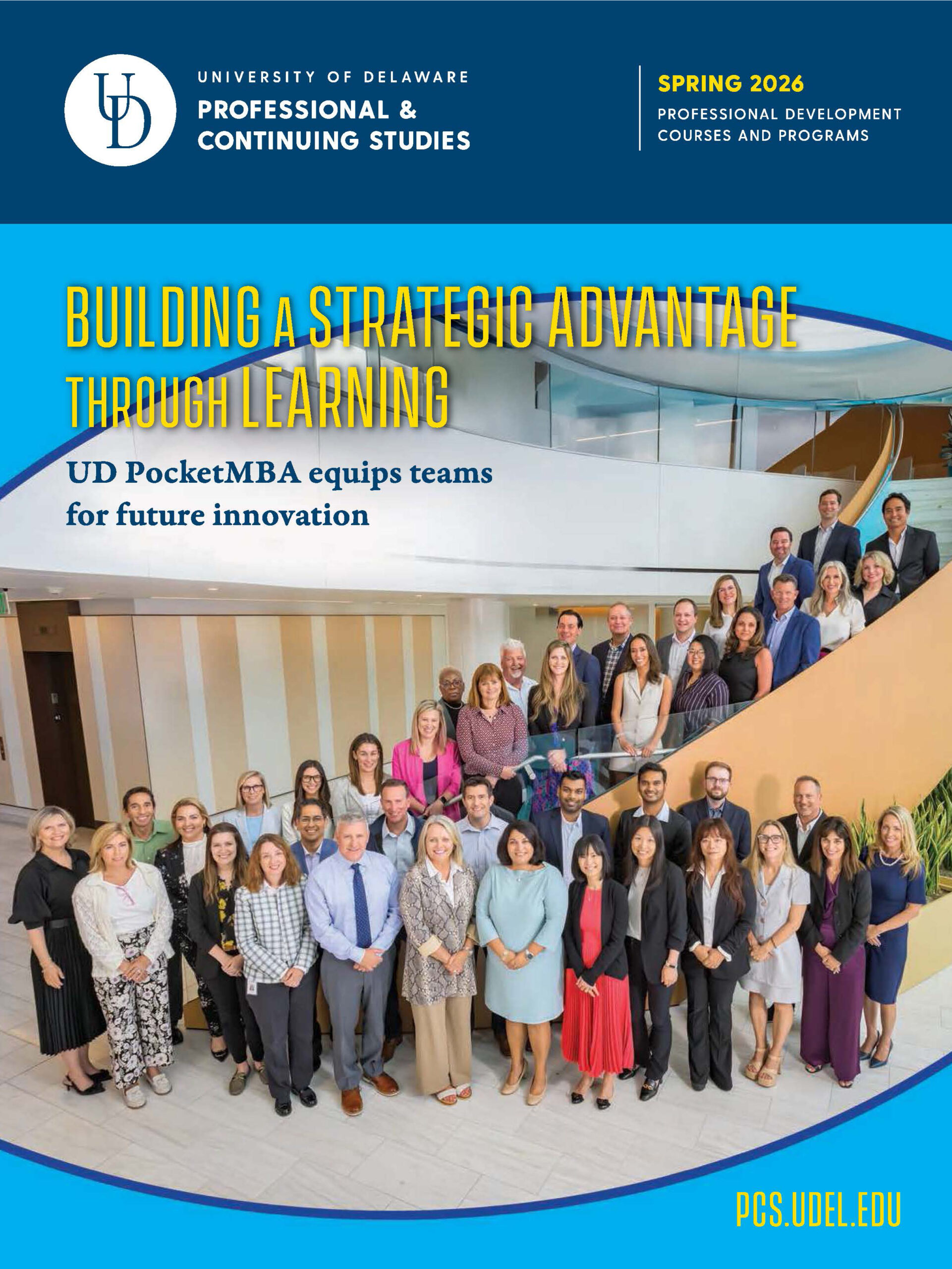
Enhance your management competencies
 Combine focused instruction with real-world examples
Combine focused instruction with real-world examples- Receive a special bundled rate for all four courses
- Participate in online classes anywhere, anytime
- Discounts available
The Project Management Institute® (PMI®) requires all credential holders to earn PDUs in the three areas of the PMI Talent Triangle®: technical, leadership, and strategic and business management. The four online, self-paced courses in the Strategic PDU Bundle provide practitioners with many of the PDUs needed to fulfill requirements in this important skill area. These four classes—Emotional Intelligence for Project Managers, Introduction to Finance, PM Primer: Conflict Resolution, and Understanding and Managing Budgets—award 11 PDUs in total, with 7.5 PDUs specifically targeted to strategic and business management competencies.
Each course contains real-world examples, videos, interactive games, assessments and focused instruction. Glossaries and search functions help students quickly and easily navigate through the course, and the “Ask the Expert” feature allows learners to pose course-related questions that are resolved within 24-48 hours by a specialist in the field.
Program details
![]() Strategic PDU Bundle – 4 courses
Strategic PDU Bundle – 4 courses
LOCATION: Online
ESTIMATED LENGTH: 11 hours
ACCESS TIME: 360 days
PRICE: $299, all materials included. Potential discounts available, including: Military, UD student/alum/employee, 2 or more (group).
0.9 CEUS | 11 HRCIs | 11 PDUS | 3 SHRMs
Courses
Emotional Intelligence for Project Managers![]()
LOCATION: Online
ESTIMATED LENGTH: 3 hours
ACCESS TIME: 90 days
PRICE: Not available for individual sale, all materials included.
0.3 CEUS | 3 HRCIs | 3 PDUS | 3 SHRMs
Emotional intelligence (EI) is our ability to identify and control our emotions to achieve positive outcomes in our relationships. Project managers with high EI are better equipped to deal with team members, vendors, stakeholders and sponsors and to handle and resolve conflicts. This course reviews the underlying concepts of emotional intelligence and explores how project managers can improve, and make use, of their emotional intelligence.
LEARNER OUTCOMES
- Discuss the role of emotional intelligence for managers and project managers.
- Explain why improving emotional intelligence can improve managerial performance.
- Recognize the importance of emotional intelligence in successful project management.
- Discuss the nine key EI factors.
- Apply EI factors to project scenarios.
NOTES
- This course has an “Ask the Expert” feature, which submits your questions directly to an expert in the field you are studying. Questions are answered as quickly as possible and usually within 24 hours.
- Learners must achieve an average test score of at least 70% to meet the minimum successful completion requirement and qualify to receive International Association of Continuing Education and Training (IACET) CEUs. Learners will have three attempts at all graded assessments.
Introduction to Finance![]()
LOCATION: Online
ESTIMATED LENGTH: 3 hours
ACCESS TIME: 90 days
PRICE: Not available for individual sale, all materials included.
0.3 CEUS | 3 HRCIs | 3 PDUS
Understanding basic finance is important for any managerial position, even non-financial managers. This introductory-level course starts at the beginning, discussing finance as an organizational setting and legal forms of business. The class continues on to cover the responsibilities of financial managers, roles of finance in a typical business organization and relevant financial markets of interest to financial managers. Further, corporate financing and the role the stock market plays in the business world are discussed.
LEARNER OUTCOMES
- Identify and differentiate the three most common types of business organizations and the structure of each.
- State the fundamental objectives of a corporation and the differences between wealth and profit maximization.
- Recognize the impact of social and ethical responsibility on business.
- Identify and describe the structure and functions of the finance department within an organization.
- Define the principal-agent relationship and strategies for overcoming conflicts of interest and motivating managers.
- List and define the five key principles that form the foundation of financial management.
- Recognize and define the five key financial markets.
- Identify the sources, rules and life cycle stages of corporate financing.
- Describe the function of the stock market and the three trading venues it utilizes.
- Recognize the factors related to interest rate determination and the impact of interest on an organization.
NOTES
- This course has an “Ask the Expert” feature, which submits your questions directly to an expert in the field you are studying. Questions are answered as quickly as possible and usually within 24 hours.
- Learners must achieve an average test score of at least 70% to meet the minimum successful completion requirement and qualify to receive International Association of Continuing Education and Training (IACET) CEUs. Learners will have three attempts at all graded assessments.
PM Primer: Conflict Resolution![]()
LOCATION: Online
ESTIMATED LENGTH: 2 hours
ACCESS TIME: 90 days
PRICE: Not available for individual sale, all materials included.
2 HRCIs | 2 PDUS
This online course focuses on how project managers can resolve conflicts in a project setting. Any time you convene a group of people to work together as closely as project teams do, conflicts are bound to happen. Project team members will likely have different views, personalities and work styles that may clash as project objectives and goals are pursued.
To ensure that project goals are achieved and project teams reach their full potential, conflicts must be carefully managed and effectively resolved by skilled practitioners and key stakeholders. Project managers and team leaders must recognize the triggers that signal conflict and intervene as early as possible to prevent problems from shifting focus away from work and to ensure that participants interact professionally as they meet their responsibilities and execute their roles.
LEARNER OUTCOMES
- Identify the stages of conflict.
- Recognize the structural differences that can cause conflict.
- Distinguish between different conflict types and apply strategies to resolve them.
- Describe how concern for oneself and concern for others interact to create different styles for dealing with conflict.
- Compare different negotiation styles and describe when each should be used.
- Demonstrate how power and Best Alternative to a Negotiated Agreement (BATNA) can be used as tools during negotiations.
NOTES
- This course has an “Ask the Expert” feature, which submits your questions directly to an expert in the field you are studying. Questions are answered as quickly as possible and usually within 24 hours.
- Learners must achieve an average test score of at least 70% to meet the minimum successful completion requirement and qualify to receive International Association of Continuing Education and Training (IACET) CEUs. Learners will have three attempts at all graded assessments.
Understanding and Managing Budgets![]()
LOCATION: Online
ESTIMATED LENGTH: 3 hours
ACCESS TIME: 90 days
PRICE: Not available for individual sale, all materials included.
0.3 CEUS | 3 HRCIs | 3 PDUS
A budget is a detail of expenses and incomes for a set period of time. This introductory-level course covers budgets and how they are used in organizational settings, including the uses and functions of master budgets, operating budgets, sales, production and cost of goods sold budgets, and cash budgets. You will also learn about the budgeting process and how organizations are using different budgeting techniques to overcome operating challenges.
LEARNER OUTCOMES
- Recognize the uses and functions of budgeting.
- Recognize the key activities, considerations and benefits of strategic organizational planning.
- Recognize the purpose and makeup of a master budget.
- Identify the components and calculations used to create a master budget and recognize uses for this information.
- Identify the components and purpose of an operating budget.
- Recognize how sales, production and cost of goods sold budgets are created, and perform related calculations.
- Recognize the purpose of cash budgets and how they are prepared.
- Identify ways the budget process can be managed for optimal results, and recognize the benefits and limitations of the management-by-objective system.
NOTES
- This course has an “Ask the Expert” feature, which submits your questions directly to an expert in the field you are studying. Questions are answered as quickly as possible and usually within 24 hours.
- Learners must achieve an average test score of at least 70% to meet the minimum successful completion requirement and qualify to receive International Association of Continuing Education and Training (IACET) CEUs. Learners will have three attempts at all graded assessments.


